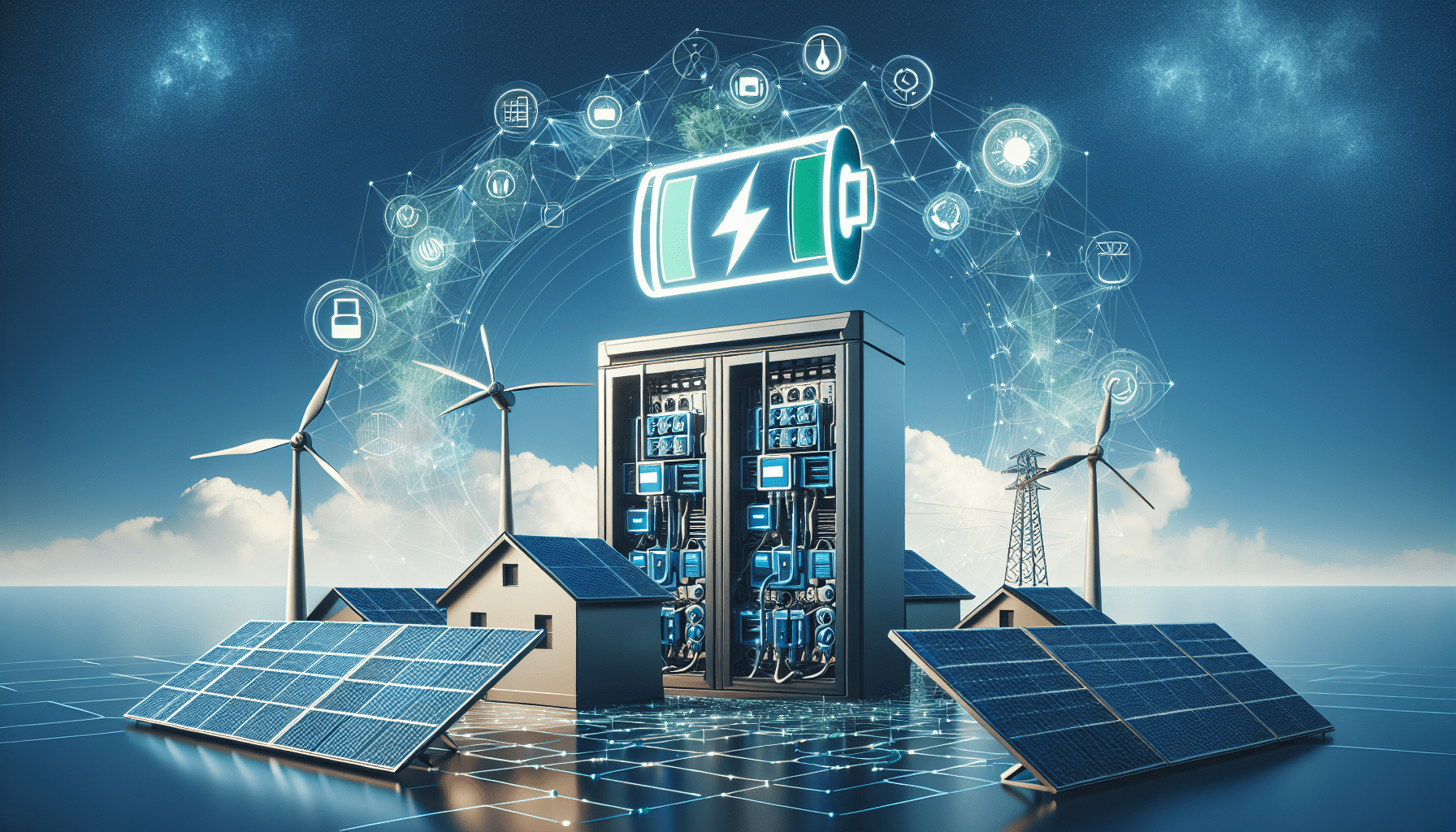You’re about to dive into a fascinating look at modern home power backup systems. In this article, “Can A Home Power Backup Recharge Itself Automatically?” you’ll explore the innovative technology that allows these systems to recharge on their own, ensuring a seamless and uninterrupted power supply for your home. Discover how these advanced systems work, their benefits, and what you need to know to keep your household running smoothly when the unexpected happens. Have you ever wondered if a home power backup can recharge itself automatically? It’s a compelling question, especially given the increasing reliance on power backup systems to keep our homes running smoothly during outages. In a world where convenience and automation are becoming the norms, it makes sense to consider whether your home’s backup power system can handle the recharging process without much human intervention. Let’s delve into the intricacies of home power backups, how they function, and explore whether they can indeed autonomously recharge themselves.
What is a Home Power Backup?
A home power backup system is designed to provide electricity to your home when the main power supply fails. These systems come in various forms, including generators, battery backups, and hybrid systems that combine both elements. The primary goal is to keep essential appliances, electronics, and devices running even when there’s a power outage.
Types of Home Power Backups
There are several types of home power backups you might consider:
- Standby Generators: Often powered by natural gas or propane, these generators automatically kick in when the power goes out.
- Portable Generators: These require manual setup and operation but are versatile and can be used in different locations.
- Battery Backup Systems: These systems store energy and provide power during an outage, often with less noise and more efficiency than traditional generators.
- Hybrid Systems: Combining battery storage with solar panels or wind turbines for a more sustainable power solution.
How Do Home Power Backups Work?
Understanding how these systems function will give you a better grasp of the possibility of them recharging automatically. Essentially, each type of backup system has its unique mechanism for providing power and recharging.
Generators
Standby and portable generators are straightforward but require different levels of user intervention. Standby generators are typically connected to your home’s electrical system and automatically start when the power goes out. They often come with auto-detection capabilities to sense power interruptions. However, these types usually don’t “recharge” in the conventional sense but rather need periodic maintenance.
Battery Backup Systems
Battery backup systems are more modern and increasingly popular. They store energy either from the grid, solar panels, or other renewable sources. When the power goes out, they supply the stored energy to your home. Some systems even come with intelligent management software to optimize power usage. These systems can indeed recharge automatically, depending on their design and connectivity to power sources.
| Feature | Standby Generators | Portable Generators | Battery Backup Systems | Hybrid Systems |
|---|---|---|---|---|
| Power Source | Natural gas/Propane | Gasoline/Diesel | Stored electricity | Solar/Wind & Grid |
| Automatic Start | Yes | No | Yes | Yes |
| Noise Level | High | High | Low | Low |
| Environmental Impact | Moderate to High | High | Low | Low |
| Recharge Capability | N/A | N/A | Yes | Yes |

Can a Home Power Backup Recharge Itself Automatically?
Now, let’s address the central question: Can a home power backup recharge itself automatically? The answer largely depends on the type of system you have and the setup.
Automatic Recharging in Battery Backup Systems
Modern battery backup systems are designed with automation in mind. They can recharge themselves using various power sources:
-
Grid Power:
- When the power is restored, these systems can automatically begin to recharge using electricity from the grid.
- Intelligent software can schedule recharging during off-peak hours to save on electricity costs.
-
Renewable Sources:
- If your battery system is connected to solar panels or wind turbines, it can continuously recharge whenever these renewable sources are available.
- This makes them highly sustainable and reduces dependency on grid power.
-
Integrated Systems:
- Some advanced systems integrate with smart home technology, allowing you to control and monitor the recharging process from your smartphone or other devices.
- Automated alerts and updates can keep you informed about the system’s status and performance.
Challenges of Automatic Recharging
Despite the advantages, there are several challenges you need to be aware of:
- Initial Cost:
- Battery backup systems with automated recharging capabilities can be expensive initially.
- Maintenance:
- While these systems are generally low-maintenance, they do require periodic checks to ensure everything is functioning correctly.
- Energy Storage Capacity:
- Depending on the size of the battery, it may take several hours to fully recharge, which can be a limitation during consecutive outages.
Generators and Automatic Recharging
Standalone generators, whether standby or portable, do not recharge in the same way as battery systems. They require fuel to operate, and this must be replenished manually. However, there are some automatic fuel supply systems that can keep them running longer without manual intervention.
Hybrid Systems
Hybrid systems offer the best of both worlds, combining renewable energy sources with battery storage and sometimes even generators. These systems are generally more complex but provide a robust and sustainable power solution. They can recharge their battery components automatically using solar or wind energy, making them suitable for long-term power outages.
Benefits of Automatic Recharging
Automated recharging provides numerous benefits, particularly for battery backup and hybrid systems. Here are some advantages:
- Convenience:
- Eliminates the need to manually intervene, giving you peace of mind during power outages.
- Efficiency:
- Smart systems optimize when and how to recharge, saving both time and energy.
- Sustainability:
- Use of renewable sources like solar and wind reduces dependency on fossil fuels and lowers your carbon footprint.
- Cost Savings:
- By leveraging off-peak hours for grid recharging or renewable energy, you can significantly cut down on electricity costs.
- Reliability:
- Automated systems ensure that your backup power is always ready to go, minimizing the downtime during outages.

Factors to Consider When Choosing a System
Before deciding on a home power backup system, it’s crucial to weigh various factors to determine what suits your needs best.
Power Requirements
Consider your home’s power requirements. Calculate the wattage needed to run essential appliances and devices.
Budget
Your budget will significantly influence the type of system you choose. While battery backups can be more expensive initially, they’re often cheaper to maintain than generators.
Environmental Impact
If reducing your carbon footprint is a priority, systems that utilize renewable energy for recharging should be your go-to.
Local Regulations
Some areas have regulations and incentives for using renewable energy systems. Check local laws to see if there are any rebates or restrictions that apply to your chosen system.
Space
The amount of physical space you have available will also be a deciding factor. Generators and larger battery systems may require more room.
Maintenance
Consider how much maintenance you’re willing to perform. Generators usually require more upkeep compared to battery systems.
Real-World Examples
Let’s look at a few real-world examples to better understand how automated recharging in home power backups can be implemented.
Tesla Powerwall
The Tesla Powerwall is a popular battery backup system that can automatically recharge using solar panels or grid electricity. It features intelligent management software that can optimize power storage and recharging. When paired with Tesla’s solar panels, the system provides a nearly autonomous power solution for your home.
Generac PWRcell
The Generac PWRcell is another example. This hybrid system can recharge itself using solar power and has robust backup capabilities. It also integrates with smart home technologies, allowing for seamless monitoring and control.
Kohler Generator with Automatic Transfer Switch
This system combines the reliability of a standby generator with an automatic transfer switch that can seamlessly switch between grid power and the generator. While it doesn’t recharge itself in the traditional sense, its automated switching mechanism ensures that your home remains powered with minimal intervention.

Future of Automated Recharging in Home Power Backups
The future looks bright for automated recharging systems, with several advancements on the horizon:
Integration with Smart Grids
As smart grids become more prevalent, your backup system can communicate with utility companies to optimize energy usage and recharging schedules.
Advanced Battery Technologies
Innovations in battery technology, such as solid-state batteries, promise greater storage capacity and faster recharging times.
AI and Machine Learning
Implementing AI and machine learning can further optimize power management, predicting outages and managing energy usage proactively.
Renewable Energy Advancements
Improvements in solar, wind, and other renewable technologies will make these systems even more efficient and reliable.
Conclusion
So, can a home power backup recharge itself automatically? The answer is a resounding yes, especially if you’re considering modern battery backup systems or hybrid solutions. These systems are designed to integrate seamlessly with various power sources, offering robust and automated recharging capabilities. While traditional generators may not have this feature, the advances in backup technology are making it easier than ever to keep your home powered with minimal manual intervention. Investing in such a system can save you time, provide peace of mind, and contribute to a more sustainable future.


